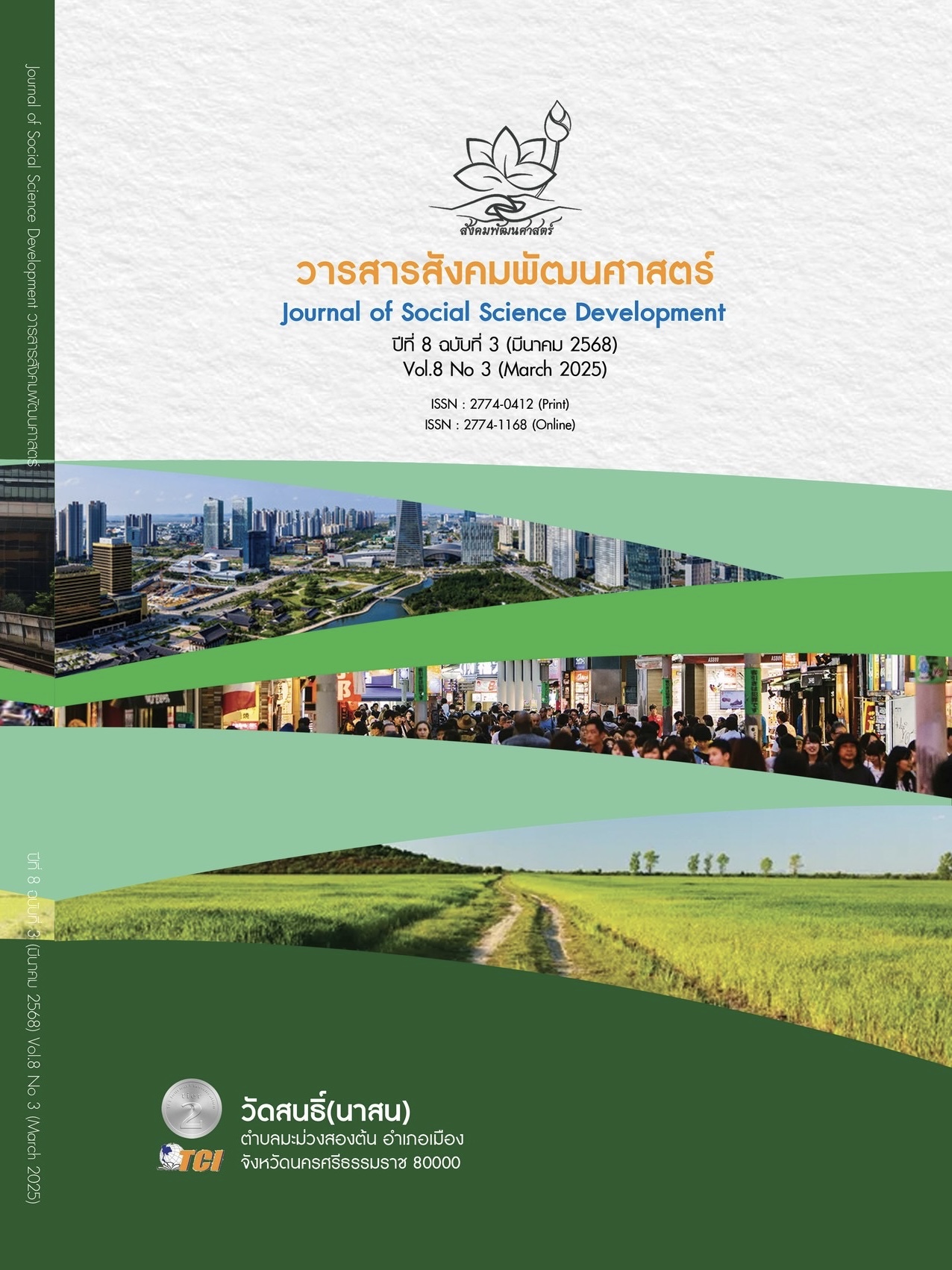THE KNOWLEDGE AND UNDERSTANDING OF TAX BENEFITS OF SMALL AND MEDIUM ENTERPRISES ENTREPRENEURS IN THE LOWER NORTH
Main Article Content
Abstract
This research aims to 1) Study personal factors of SME entrepreneurs in the lower northern region, 2) Study the level of knowledge and understanding of tax benefits of SME entrepreneurs in the lower northern region, and 3) Study the comparison of personal factors affecting the level of knowledge and understanding of tax benefits of SME entrepreneurs in the lower northern region. This research is a quantitative research with a total of 400 samples. Purposive sampling was used. A questionnaire was used as the tool. Data was collected via an online questionnaire, Google Forms. Descriptive statistics were used for data analysis, including percentages and means, and inferential statistics, including t-test and One-Way ANOVA, using ready-made computer programs. The results of the research found that knowledge and understanding of tax benefits of SME entrepreneurs in the lower northern region was at a high level, with a mean of 0.75 and a standard deviation of 0.079, because SME entrepreneurs increasingly recognize the importance of knowledge and understanding of tax benefits by studying information sources on related websites and consulting with accounting offices. In order to understand the tax benefits that will help in tax planning within the business, for suggestions, interested parties can use the results of the study to develop a survey to collect data and study in a wider area and population at other regional and national levels, which will enable SME entrepreneurs to better understand the tax benefits and apply the results of the study to relevant agencies.
Article Details

This work is licensed under a Creative Commons Attribution-NonCommercial-NoDerivatives 4.0 International License.
References
กรมสรรพากร. (2565). สิทธิประโยชน์ทางภาษีสำหรับธุรกิจ SMEs. เรียกใช้เมื่อ 22 ตุลาคม 2567 จาก https://www.rd.go.th/47331.html
จิณณ์ชญา รณิดา และสุพิน ฉายศิริไพบูลย์. (2564). ปัจจัยเชิงสาเหตุด้านบัญชีเพื่อการจัดการที่ส่งผลต่อการวางแผนภาษีอากรของผู้ประกอบการในประเทศไทย. วารสารสถาบันวิทยาการจัดการแห่งแปซิฟิค, 7(1), 470-483.
จิตรเลขา ทาสี และคณะ. (2561). คุณลักษณะของนักบัญชีที่พึงประสงค์ของผู้ประกอบการในเขตกรุงเทพมหานคร. วารสารรัชต์ภาคย์, 14(37), 11-15.
ดนัย ดำรงชัยโยธิน. (2551). การศึกษาสิทธิประโยชน์ทางภาษีสรรพากรของวิสาหกิจขนาดกลางและขนาดย่อม. ใน รายงานการวิจัย. มหาวิทยาลัยสุโขทัยธรรมาธิราช.
ดาระณี สุรินทรเสรี และคณะ. (2563). สิทธิและประโยชน์ทางด้านภาษีอากรสำหรับวิสาหกิจขนาดกลางและขนาดย่อม. วารสารวิชาการมหาวิทยาลัยราชภัฏบุรีรัมย์, 12(2), 115-129.
นิ่มนวล วิเศษสรรพ และคณะ. (2565). โครงสร้างความสัมพันธ์เชิงสาเหตุของปัจจัยที่มีอิทธิพลต่อความตั้งใจปฏิบัติตามกฎหมายภาษีเงินได้นิติบุคคลของธุรกิจขนาดกลางและขนาดย่อม. วารสารมนุษยศาสตร์และสังคมศาสตร์มหาวิทยาลัยนครพนม, 12(3), 196-214.
ปิยะฉัตร จารุธีรศานต์. (2552). ความรับผิดชอบของผู้ประกอบการต่อสังคมกับภาษีอากรในเขตพญาไท. ใน รายงานการวิจัย. มหาวิทยาลัยรามคำแหง.
วรนุช กุอุทา. (2562). ความรู้ความเข้าใจในด้านภาษีเงินได้นิติบุคคลของผู้เสียภาษีเงินได้นิติบุคคลในอำเภอเมืองจังหวัดอุบลราชธานี. วารสารวิชาการมหาวิทยาลัยการจัดการและเทคโนโลยีอีสเทิร์น, 16(2), 331-337.
วรรณวิสา หนูห้อง และสุเทพ บูรณะคุณาภรณ์. (2559). การศึกษาปัจจัยที่มีผลต่อการจัดเก็บภาษีเงินได้นิติบุคคลของประเทศไทย. วารสารเศรษฐศาสตร์รามคําแหง, 2(2), 53-59.
วิชชกานต์ เมธาวิริยะกุล. (2560). มาตรการบัญชีชุดเดียวและการยกเว้นและลดอัตราภาษีเงินได้นิติบุคคลสำหรับSMEs. วารสารบัญชีปริทัศน์มหาวิทยาลัยราชภัฏเชียงราย, 2(1), 15-24.
สายสมร สังข์เมฆ. (2566). การรับรู้และความคาดหวังของผู้ประกอบการรายใหม่เกี่ยวกับการปฏิบัติทางภาษีอากร. วารสารวิทยาการจัดการปริทัศน์, 25(3), 104-117.
สำนักงานส่งเสริมวิสาหกิจขนาดกลางและขนาดย่อม. (2565). ภาพรวมการให้บริการของศูนย์ให้บริการ SME ครบวงจรปีงบประมาณ 2565. เรียกใช้เมื่อ 26 ตุลาคม 2567 จาก https://oss.sme.go.th/oss/nportalno.aspx
สำนักเลขาธิการนายกรัฐมนตรี. (2565). มาตรการภาษียกเว้นภาษีเงินได้นิติบุคคล 2 เท่าสนับสนุนการจัดสัมมนานิทรรศการงานแสดงสินค้าภายในประเทศ. เรียกใช้เมื่อ 26 ตุลาคม 2567 จาก https://www.thaigov.go.th/news/contents/details/56818
Erle. (2008). Linking QWL and job performamce: Implications for organizations. Performance Improvement, 46(6), 30-35.
Photikham, P. (2022). Factors affecting efficiency in paying corporate income tax of entrepreneursunder the supervision of the Business Tax Administration Division. Retrieved November 23, 2024, from https://mmm.ru.ac.th/MMM/IS/mmm25/6314131060.pdf


